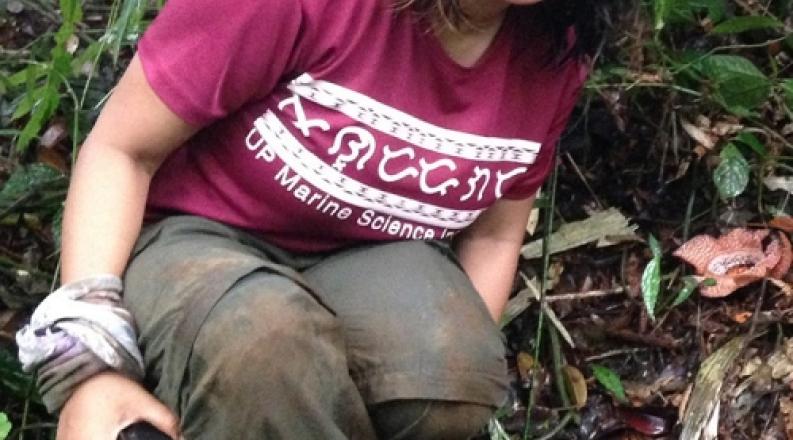By: Tiffany Whitfield
Jemelyn Baldisimo, a Ph.D. student in the Department of Biological Sciences at Old Dominion University, has been awarded a Virginia Sea Grant Graduate Research Fellowship. Baldisimo's research will assess the vulnerability of ornamental coral reef fishes. Her research will address coastal resource issues, in collaboration with her academic and professional mentors and how it can be applied for the benefit of Virginia's coastal stakeholders.
The Virginia Sea Grant Graduate Student Fellowship is a highly competitive fellowship program open to graduate students from eight universities in Virginia, Old Dominion University, Virginia Tech, William and Mary, James Madison University, George Mason University, University of Virginia, and Virginia Commonwealth University. This year, there were over 30 applicants, and Baldisimo was one of eight graduate students awarded up to $40,000 to support research that addresses coastal challenges in Virginia.
"We're excited to welcome a new cohort of Graduate Research Fellows to Virginia Sea Grant," said Michelle Rodriguez, VASG's professional development coordinator. "We look forward to supporting them as they grow as professionals and apply their research to coastal challenges in Virginia."
"My proposed project involves assessing the vulnerability of marine ornamental fishes, also known as saltwater aquarium fishes, to overfishing," said Baldisimo. The United States is one of the top importers of wild-caught saltwater fishes, which are sold to hobbyists and displayed in aquariums. "More research is needed to find out the impacts of the trade on targeted fish populations and ensure its long-term sustainability," said Baldisimo. "Results from the study can help determine priority marine ornamental species for conservation and research."
The majority of exported marine ornamental fishes—those caught from reefs and sold for use in aquariums—do not have a vulnerability assessment. Back in 2005, more than 11 million fish were imported into the United States, raising concerns that too many fish were being harvested for the aquarium trade than was sustainable. As part of her research, Baldisimo will help prioritize which fish need conservation by identifying which species are most vulnerable to overfishing.
As part of the fellowship, Baldisimo will be working with a professional mentor from the Virginia Seafood Agricultural Research and Extension Center (VSAREC), Jonathan van Senten, Ph.D. "We plan to execute an outreach plan involving the creation of educational materials for pet stores and aquarium hobbyists," said Baldisimo. "This outreach plan also supports Virginia's marine ornamental aquaculture initiatives by providing educational literacy for the public."
Her research builds on her contributions to the National Assessment of Coral Reef Environments Program and the Philippine National Biodiversity Species Action Plan. As part of her fellowship, Baldisimo will work with a professional mentor at the Virginia Tech Seafood Agricultural Research and Extension Center (VSAREC) to create educational products for pet stores and aquarium hobbyists. VSAREC staff are experts in the field of aquaculture and have been working with the private sector to grow Virginia's ornamental aquaculture industry since 2015. Baldisimo's research will complement efforts at VSAREC to develop aquaculture protocols for popular aquarium fishes.
Prior to coming to ODU, Baldisimo was involved in a project under the National Assessment of Coral Reef Environments Program that gathered data on the status of coral reef fish populations and the fisheries livelihood in the Philippines. "The Philippines is one of the top exporters of aquarium fishes and it was through this project that I was able to connect with fishers who were involved in the trade," said Baldisimo.
Baldisimo's other research interests include environmental sustainability and marine conservation, with special focus coral reef fishes. "I aim to learn about various tools, such as risk-based and population genetics, to determining priority species for conservation and research," said Baldisimo. "I contribute to the Carpenter Lab through my involvement in the Global Marine Species Assessment Program under the IUCN and the NSF-funded Philippines PIRE Project."
Virginia Sea Grant addresses coastal challenges through applied research, collaboration, and technical advisory (extension). We are a six-university partnership funded through the National Oceanic and Atmospheric Administration and the Commonwealth of Virginia.



